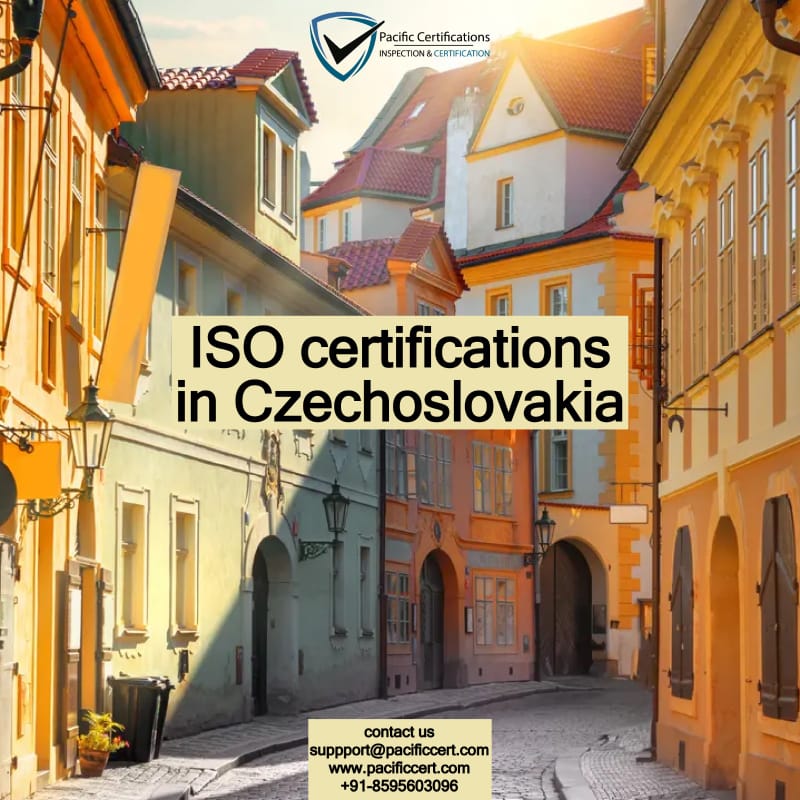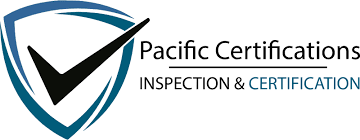ISO Certifications in Czechoslovakia, Popular Standards, Requirements and Benefits

Introduction
ISO certifications represent a global benchmark for quality, environmental management, occupational health and safety, information security, and various other aspects of business operations. Although Czechoslovakia, as a unified country, ceased to exist in 1993, splitting into the Czech Republic and Slovakia, the relevance and pursuit of ISO certifications remain strong within these successor states. Both countries have embraced ISO standards to enhance business processes, improve efficiency, and meet international compliance requirements.
ISO Certifications Commonly Pursued in the Czech Republic and Slovakia
ISO 9001 - Quality Management Systems (QMS):
This is the most widely recognized ISO standard, focusing on meeting customer requirements and enhancing customer satisfaction. It's applicable to organizations of all sizes and industries.
ISO 14001 - Environmental Management Systems (EMS):
This standard helps organizations improve their environmental performance through more efficient use of resources and reduction of waste, gaining a competitive advantage and the trust of stakeholders.
ISO 45001 - Occupational Health and Safety Management Systems:
This standard is crucial for organizations committed to providing safe and healthy workplaces, thereby preventing work-related injury and ill health.
ISO 27001 - Information Security Management Systems (ISMS):
With the growing concern for information security, ISO 27001 helps organizations secure their information assets, such as financial information, intellectual property, employee details, or information entrusted by third parties.
Product Certifications (e.g., CE Marking, HACCP, GMP):
These certifications are crucial for products that are to be marketed in the European Union. CE Marking, for example, is a declaration that a product meets the EU standards for health, safety, and environmental protection.
Click here to find out more applicable standards to your industry
Requirements of ISO Certifications in Czechoslovakia
Given the historical context where Czechoslovakia no longer exists as a unified country since its peaceful split into the Czech Republic and Slovakia in 1993, we will address the requirements for ISO certifications within the context of these two independent nations. The requirements for obtaining ISO certifications are broadly similar across countries due to the international nature of these standards.
Organizations in both the Czech Republic and Slovakia seeking ISO certifications such as ISO 9001 (Quality Management Systems), ISO 14001 (Environmental Management Systems), ISO 45001 (Occupational Health and Safety Management Systems), ISO 27001 (Information Security Management Systems), and various product certifications (like CE Marking, HACCP, GMP) need to follow a series of steps that generally include:
Understanding the ISO Standard
Study the Standard: Obtain a copy of the specific ISO standard(s) you are interested in and understand the requirements. This includes the principles, practices, and documentation requirements.
Gap Analysis
Conduct a Gap Analysis: Determine the current position of your organization in relation to the standard. Identify areas that require changes or improvements to meet the standard's requirements.
Documentation
Develop Documentation: Prepare documentation as required by the standard. This might include policies, objectives, processes, and procedures that align with the standard's requirements. Documentation plays a crucial role in demonstrating compliance.
Implementation
- Implement Changes: Apply the changes and improvements identified during the gap analysis. This involves integrating the standard’s requirements into the organization’s processes and operations.
- Employee Training: Ensure that all employees are trained on the new procedures and understand their roles within the ISO framework.
Internal Audit
Conduct an Internal Audit: Before undergoing the certification audit, conduct internal audits to assess the effectiveness of the implemented system and identify areas for improvement.
Management Review
Review by Management: The management should review the system’s performance, looking at audit results, customer feedback, and process performance, to ensure continuous improvement.
Choose a Certification Body
Select a Certification Body: Choose a certification body like Pacific Certifications that is accredited and recognized. Ensure they are accredited to issue certifications for your specific ISO standard and in your geographic region.
Certification Audit
Undergo a Certification Audit: The chosen certification body will conduct a formal audit. If non-conformities are found, they must be addressed before the certification can be granted.
Continuous Improvement
Ongoing Improvement: ISO standards require continuous monitoring and improvement of processes. Regular surveillance audits may be conducted by the certification body to ensure ongoing compliance.
How Pacific Certifications Can Assist?
Pacific Certifications, being a certification body accredited to issue management system certifications, can guide organizations in the Czech Republic and Slovakia through this process. Post-certification, We at Pacific Certifications can continue to support organizations to ensure they maintain their ISO certifications and adhere to the standards through surveillance audits and continuous improvement practices.
It's crucial for organizations seeking ISO certification in these countries to engage with a certification body that not only understands the local business landscape but also has a deep knowledge of the specific standards they wish to attain. This ensures not just compliance but also a value-added approach to certification that can enhance business processes, efficiency, and market competitiveness.
Benefits of ISO Certifications in Czechoslovakia
While the specific context of Czechoslovakia has evolved since the country's split into the Czech Republic and Slovakia, the benefits of ISO certifications within these two nations are significant and align with the global advantages of achieving such standards. Businesses in both countries, as in others around the world, seek ISO certifications to meet regulatory requirements, enhance business efficiency, improve product quality, and increase customer satisfaction. Let's delve into the key benefits that organizations in the Czech Republic and Slovakia can achieve through ISO certifications.
Enhanced Reputation and Competitive Advantage
- International Recognition: ISO certifications are recognized globally, providing businesses with a competitive edge in the international market. This is especially beneficial for exporters and those looking to expand their business operations abroad.
- Increased Credibility: Certification demonstrates an organization's commitment to quality, safety, and efficiency, enhancing its reputation among customers, partners, and stakeholders.
Improved Efficiency and Productivity
- Standardized Processes: ISO standards require organizations to define and follow clear procedures and processes. This standardization helps in minimizing errors and increasing efficiency.
- Quality Improvement: Implementing ISO standards often leads to improved quality of products and services, as the focus is on meeting customer requirements and exceeding expectations.
Market Expansion
- Access to New Markets: Certain markets require ISO certification as a prerequisite for doing business. Being certified can open up new markets and customer segments.
- Compliance with Regulations: ISO certifications can help ensure compliance with national and international regulations and standards, reducing the risk of legal or regulatory issues.
Risk Management
- Improved Risk Management: Many ISO standards incorporate risk management principles, helping organizations anticipate and mitigate potential risks more effectively.
- Information Security: For certifications like ISO 27001, the emphasis on securing information assets can protect organizations against data breaches and cyber threats, which is increasingly important in the digital age.
Cost Savings
- Operational Efficiencies: By optimizing operations and improving efficiency, organizations can achieve significant cost savings. Reduced waste, improved resource management, and enhanced productivity all contribute to lower operating costs.
- Prevention of Fines and Downtime: Compliance with standards can prevent costly fines and operational downtime due to non-compliance with regulations.
Employee Engagement
- Improved Employee Morale: Involving employees in process improvements and achieving ISO certification can lead to higher job satisfaction and engagement.
- Clear Roles and Responsibilities: ISO standards help in defining clear roles and responsibilities, which can improve organization and communication within the company.
Customer Satisfaction
- Meeting Customer Expectations: ISO standards focus on meeting customer requirements and improving customer satisfaction, leading to increased loyalty and repeat business.
- Feedback and Continuous Improvement: Regular reviews and audits required for maintaining certification encourage continuous improvement and adaptation to customer needs.
Environmental Impact
- Environmental Performance: For certifications like ISO 14001, there's a significant focus on reducing environmental impact and promoting sustainable practices, aligning with global efforts towards environmental sustainability.
For businesses in the Czech Republic and Slovakia, the pursuit and maintenance of ISO certifications are not just about meeting the minimum requirements for operation but are strategic tools for improving overall performance, opening new opportunities, and ensuring sustainable growth. Organizations like Pacific Certifications can play a crucial role in guiding companies through the certification process, ensuring that they fully understand and reap the benefits of their ISO certifications.
Which industries need ISO Certifications in Czechoslovakia
Since Czechoslovakia split into the Czech Republic and Slovakia, industries in both countries have continued to align with global standards, including ISO certifications, to improve quality, ensure safety, and enhance environmental management. ISO certifications are not limited to specific industries; instead, they span across various sectors, depending on the objectives, customer requirements, and regulatory landscapes of each industry. Here are some industries in the Czech Republic and Slovakia where ISO certifications are particularly relevant and often required:
Manufacturing
- ISO 9001 (Quality Management Systems): Essential for manufacturing companies to demonstrate their ability to consistently provide products that meet customer and regulatory requirements.
- ISO 14001 (Environmental Management Systems): Important for manufacturing industries looking to reduce their environmental impact, comply with regulations, and improve their sustainability practices.
- ISO 45001 (Occupational Health and Safety Management Systems): Crucial for ensuring a safe working environment, reducing workplace risks, and protecting employee well-being.
Information Technology
- ISO/IEC 27001 (Information Security Management Systems): Highly relevant for IT companies to manage the security of assets such as financial information, intellectual property, employee details, or information entrusted by third parties.
Food and Beverage
- ISO 22000 (Food Safety Management Systems): Applies to organizations in the food chain, ensuring food safety and managing risks associated with foodborne illnesses.
- HACCP (Hazard Analysis and Critical Control Points): While not an ISO standard, HACCP is a systematic preventive approach to food safety, often integrated with ISO 22000.
Healthcare and Pharmaceuticals
- ISO 13485 (Medical Devices - Quality Management Systems): Pertinent for organizations involved in the design, production, installation, and servicing of medical devices and related services.
- ISO 45001 and ISO 14001: Also relevant for ensuring employee safety and managing environmental impact in these industries.
Construction and Engineering
- ISO 9001: Ensures quality management in construction projects, from design through to construction and maintenance.
- ISO 45001: Addresses safety in potentially hazardous work environments.
Automotive
- IATF 16949 (Quality Management System for Automotive Production): A global standard that incorporates ISO 9001 requirements with additional quality standards specific to the automotive industry.
Energy and Utilities
- ISO 50001 (Energy Management Systems): Supports organizations in establishing systems and processes to improve their energy performance, including efficiency and consumption.
Financial Services
- ISO/IEC 27001: Particularly relevant for protecting financial information against risks such as data breaches and cyber-attacks.
Environmental Services
- ISO 14001: Critical for organizations aiming to manage their environmental responsibilities in a systematic manner that contributes to the environmental pillar of sustainability.
Education and Training
- ISO 21001 (Educational Organizations - Management Systems for Educational Organizations): Helps educational providers meet students' and other beneficiaries' needs more effectively.
The necessity for ISO certifications in these industries is driven by a combination of customer expectations, regulatory requirements, and a strategic approach to risk management, quality improvement, and sustainability. Organizations across these sectors in the Czech Republic and Slovakia can benefit from pursuing ISO certifications not only to meet compliance and regulatory requirements but also to enhance operational efficiencies, manage risks more effectively, and gain a competitive edge in the global market. Working with a certification body like us, Pacific Certifications can facilitate this process, offering expertise and support through certification audits, training, and continuous improvement strategies.
Pacific Certifications is accredited by ABIS, in case you need support with ISO certification for your business in Czechoslovakia, please contact us at [email protected] or +91-8595603096.
Ready to get ISO certified?
Contact Pacific Certifications to begin your certification journey today!
Suggested Certifications –
Read more: Pacific Blogs

